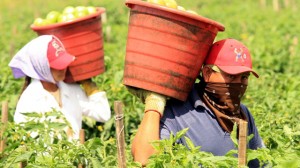
Farmworkers pick tomatoes at Taylor & Fulton Tomatoes in Immokalee, Fla. March 2006 (AP Photo/Luis M. Alvarez)
No group of workers is as vulnerable to abuse today as migrant farm laborers. They are often forced to work grueling hours in tough conditions for meager pay. And, as a report by Oxfam America and Farmworker Justice documents, wage theft, sexual harassment and other abuses are widespread. In the past 15 years, there have been seven prosecutions for modern-day slavery in Florida alone.
It’s that vulnerability that makes the story of the Coalition of Immokalee Workers so inspiring. They’ve shown what can be accomplished when even the most marginalized workers band together to demand some basic human dignity.
In The New York Times, labor reporter Steven Greenhouse writes about how their progress is helping farmworkers in other states:
Not long ago, Angelina Velasquez trudged to a parking lot at 5 each morning so a crew leader’s bus could drop her at the tomato fields by 6. She often waited there, unpaid — while the dew dried — until 10 a.m., when the workers were told to clock in and start picking.
Back then, crew leaders often hectored and screamed at the workers, pushing them to fill their 32-pound buckets ever faster in this area known as the nation’s tomato capital. For decades, the fields here have had a reputation for horrid conditions. Many migrant workers picked without rest breaks, even in 95-degree heat. Some women complained that crew leaders groped them or demanded sex in exchange for steady jobs.
But those abusive practices have all but disappeared, said Ms. Velasquez, an immigrant from Mexico. She and many labor experts credit a tenacious group of tomato workers, who in recent years forged partnerships with giant restaurant companies like McDonald’s and Yum Brands (owner of Taco Bell, Pizza Hut and KFC) to improve conditions in the fields.
By enlisting the might of major restaurant chains and retailers — including Walmart, which signed on this year — the Coalition of Immokalee Workers has pressured growers that produce 90 percent of Florida’s tomatoes to increase wages for their 30,000 workers and follow strict standards that mandate rest breaks and forbid sexual harassment and verbal abuse.
The incentive for growers to comply with what’s called the Fair Food Program is economically stark: The big companies have pledged to buy only from growers who follow the new standards, paying them an extra penny a pound, which goes to the pickers. The companies have also pledged to drop any suppliers that violate the standards.
So far, the agreements between retailers and growers are limited to Florida’s tomato fields, which in itself is no small feat considering that the state produces 90 percent of the country’s winter tomatoes.
But gaining the heft and reach of Walmart — which sells 20 percent of the nation’s fresh tomatoes year-round — may prove far more influential. To the applause of farmworkers’ advocates, the retailer has agreed to extend the program’s standards and monitoring to its tomato suppliers in Georgia, South Carolina and Virginia and elsewhere on the Eastern Seaboard. Walmart officials say they also hope to apply the standards to apple orchards in Michigan and Washington and strawberry fields in many states.
Read the whole piece at The New York Times.

